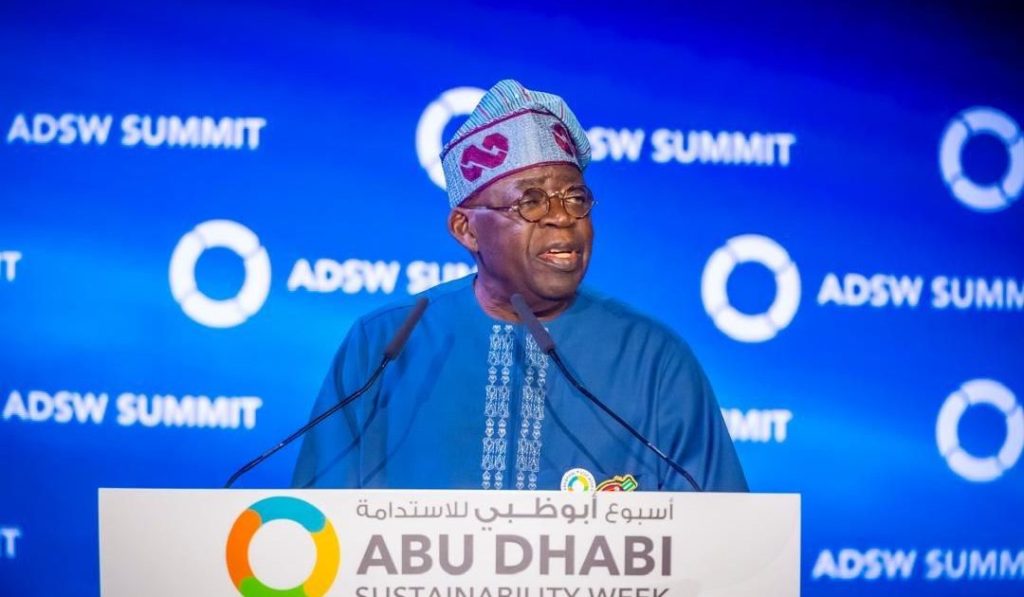Paragraph 1: Nigeria’s Commitment to Climate-Smart Agriculture and Sustainable Development
President Bola Tinubu of Nigeria affirmed his administration’s dedication to climate-smart agriculture and sustainable development during the Abu Dhabi Sustainability Week. He emphasized the nation’s role in leading a just energy transition and sustainable growth in Africa, recognizing the interconnectedness of environmental protection, economic prosperity, and social equity. Tinubu framed Nigeria’s efforts within a three-pillar approach: energy transition, climate resilience, and sustainable development, highlighting the urgency of international collaboration to address climate change and achieve global sustainability goals. He positioned Nigeria, as Africa’s largest economy and most populous nation, as a key player in demonstrating leadership on these critical issues.
Paragraph 2: Nigeria’s Energy Transition and Climate-Smart Agriculture
President Tinubu articulated Nigeria’s multi-faceted strategy for navigating the energy transition and mitigating climate change impacts. Central to this strategy is the adoption of climate-smart agricultural practices, which aim to enhance food security while minimizing environmental consequences. He outlined policy initiatives such as the National Clean Cooking Gas Policy, designed to promote clean energy and socioeconomic development. These measures, coupled with the diversification of energy sources and a move away from fossil fuels, form the core of Nigeria’s sustainable development strategy. Tinubu stressed the importance of modern, eco-friendly agricultural techniques in protecting local communities from the adverse effects of climate change and ensuring a sustainable food supply.
Paragraph 3: Nigeria’s Path to Net-Zero Emissions and Investment in Green Technologies
Nigeria’s commitment to reaching net-zero emissions by 2060 underscores its dedication to global climate objectives. Tinubu detailed the country’s investments in developing infrastructure for compressed natural gas and electric vehicles, further solidifying its transition towards cleaner energy alternatives. He highlighted the exploration of solid minerals and critical metals crucial for the green energy transition, emphasizing the importance of responsible resource management. This comprehensive approach, encompassing policy initiatives, infrastructure development, and strategic resource utilization, positions Nigeria at the forefront of Africa’s efforts in mitigating climate change.
Paragraph 4: Addressing Nigeria’s Environmental Challenges and Promoting a Green Economy
Acknowledging the environmental challenges facing Nigeria, including deforestation, desertification, coastal erosion, flooding, and pollution, Tinubu stressed the need for integrated solutions. He specifically cited the shrinking Lake Chad as a stark reminder of the impact of climate change on livelihoods and ecosystems. The President advocated for sustainable practices across all economic sectors and emphasized the need for global partnerships and investment to achieve a green economy in Africa. He underscored the capital-intensive nature of these investments, calling for support from international partners, organizations, and individuals committed to a sustainable and equitable future.
Paragraph 5: Nigeria’s Leadership in Green Finance and Technological Innovation
President Tinubu showcased Nigeria’s pioneering role in green finance, highlighting its status as the first African nation to fund green projects through Sovereign Green Bond issuances. He invited further investor collaboration in this area, signaling the country’s commitment to attracting international capital for sustainable development. He emphasized the importance of technological innovation in driving sustainable practices, citing Nigeria’s increasing adoption of new technologies in clean energy, water conservation, land restoration, waste management, and the circular economy. He envisions a future where AI-driven agricultural practices and technological advancements play a crucial role in addressing environmental challenges and securing a brighter future.
Paragraph 6: The Importance of Global Collaboration and a Shared Vision for the Future
President Tinubu concluded his address by emphasizing the global nature of environmental challenges and the need for collective action. He called for strengthened international cooperation at regional and global levels to achieve the Sustainable Development Goals and mitigate the impacts of climate change. Reflecting on the symbolism of children waving the UAE flag at the event, he urged the international community to uphold its responsibility to future generations. He expressed gratitude to the UAE’s leadership for hosting the Abu Dhabi Sustainability Week, a platform for global dialogue and collaboration on pressing environmental issues, and reiterated Nigeria’s commitment to a sustainable, prosperous, and equitable future for all. The presence of other world leaders at the summit further highlighted the global significance of the event and the shared commitment to addressing these critical challenges.














